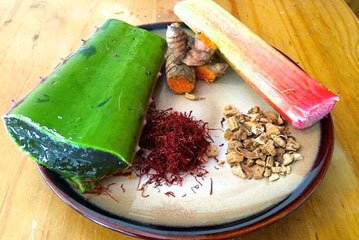
Archaeologists recreate Elixir of Long Life recipe from unearthed bottle
Beneath a construction site for a glassy, 22-story hotel in New York, archaeologists unearthed a history of drinking, eating and lodging, along with a tradition of consuming cure-alls and potions for good health, according to a report in DNA Info. The discovery included a two hundred-year-old glass bottle that once contained the “Elixir of Long Life”. Now the research team have tracked down the original German recipe used to create the elixir for fending off death.
“We decided to engage in our own brand of experimental archaeology,” said Alyssa Loorya, the president of Chrysalis, a company regularly hired by the city to oversee excavation projects. Loorya enlisted researchers in Germany to track down the recipe in an old medical guide, which revealed that the potion contained ingredients such as aloe, which is anti-inflammatory, gentian root, which aids digestion, as well as rhubarb, zedoary, and Spanish saffron – ingredients still used by herbalists today.

The raw ingredients for an ‘Elixir of Long Life’. Photo credit: DNAinfo/Irene Plagianos
In addition to the Elixir of Long Life, archaeologists also discovered two bottles of Dr Hostetters Stomach Bitters, a once-popular 19 th century medicine, which contained a complex mixture of ingredients including Peruvian bark, which has malaria-fighting properties, and gum kino, a kind of tree sap that is antibacterial. Loorya and her team are have recreated both types of elixir, which they say taste very bitter.
The search for the Elixir of Life has been the supreme quest for many. In medieval times, there are accounts of the alchemists looking for the philosopher’s stone, believed to be required to create the elixir but also to convert lead to gold. Bernard Trevisan, an alchemist of the 15th century said that dropping the philosopher’s stone into mercurial water would create the elixir, and we have multiple cases of alchemists who claim to have found the Elixir of Life, including the infamous Cagliostro or Saint Germain.

Images depicting the Elixir of Long Life
Ancient references to immortality, or extremely long life spans, can be traced back thousands of years. The 4,000-year-old Sumerian King’s List, for example, refer to rulers who reigned for tens of thousands of years. Even the Bible refers to individuals who lived for hundreds of years, prior to the ‘Great Flood’.
Ancient myths and legends from numerous cultures around the world refer to special food or drink that were reserved for the ‘gods’ and kept them immortal. For the Greek gods it was ambrosia and nectar, in Zoroastrian and Vedic mythologies, we can see reference to a special drink known as Soma and Haoma respectively. In Egyptian mythology, Thoth and Hermes drank ‘white drops’ and ‘liquid gold’, which were said to keep them immortal. In Sumerian texts, we have references to the Ninhursag’s milk, which was drunk by the kings of ancient Sumer. In the Hindu religion, the gods would harness a milk called Amrita, a nectar that was collected and drunk by the gods to give them immortality, but forbidden for humans to drink. In Chinese mythology, we have the ‘peaches of immortality’. Are all these references simply the imagination of our ancient ancestors? Or were their cultures that really achieved significant longevity? Perhaps there is at least some truth behind the Elixir of Long Life…
















Comments
That book about Fulcanelli is one of the most fascinating books I have ever read about mysterious subjects.
I agree the book doesn't answer all the questions about alchemy.
If the legends are true alchemy is a secret art that is revealed to only a very few people.+
There's some corroboration for alchemy in another great book which is 'Initiation' by Elisabeth Haich.
Elisabeth's book is an account of a past life she experienced in ancient Egypt.
She said alchemy was one of the subjects the initiates learned about.
Elisabeth mentioned something called the universal solvent.
I guess this is some sort of substance that can disintegrate any other form of matter.
Fringe author Joseph Farrell says some interesting things about alchemy also.
However with Farrell you have to sift through some of his other far out ideas.
I have enjoyed his books though.
Initiation
[Paperback – July 28, 2000]
by Elisabeth Haich (Author)
The Philosopher's Stone: Alchemy and the Secret Research for Exotic Matter
[Paperback – April 1, 2009]
by Joseph P. Farrell (Author)
The thing about Fulcanelli's book is that it provokes more questions than it provides answers.
I found greater insight into this subject through the study of Ayurveda and from the unwritten oral history of various Sadhus and gurus that I met that shared things with me on my travels.
Ayurveda, means the science of life. Ayur means science and Veda means life and in it bitter herbs feature very strongly.
Thank you Jeff for your comment. We will look into Fulcanelli. Very interesting!
Well that's an interesting question about whether there are people around today who still know those ancient secrets.
There are theories that Moses was a member and initiate of the ancient and secret Egyptian priesthood.
Some of the events in the Book Of Exodus in the bible may involve alchemy such as the story about the golden calf.
Moses ground the golden statue into a powder, mixed this powder with gold, and told the Hebrews to drink it.
A subject that is very interesting for me right now is the human body's ability to regenerate itself.
The following message talks more about this.
Jeff Marzano 10:06 PM
There seems to have been a very advanced form of science and other mystical information that existed on planet Earth at some point in the distant past.
People are now starting to realize that the pyramids were machines like power plants.
I had read about strange legends where the priests in Egypt could cause the human body to regenerate an arm or leg that had been lost and warfare.
These priests using devices called 'energy rods' which generated light and sound which are vibrations to stimulate the human body's regenerative powers.
These arcane healing arts were practiced in the utmost secrecy in the Egyptian temples. Even the people who worked in the temples didn't know where the secret healing chambers were.
It's very interesting because doctors today now realize that this legend is true.
Regeneration is the new frontier in medicine today. Rather than create artificial limbs and do organ transplants doctors are trying to use stem cells and pig tissue to trigger the body to recreate itself.
Right now they are taking tissue from pig bladders which they form into a sort of mesh.
If this mesh is applied to for example a leg that has had the muscle tissue destroyed the body will try to recreate the lost muscle and replace the mesh with the new tissue.
It is probably also possible to stop and reverse the aging process and prolong physical life indefinitely.
That's one of the alleged powers of alchemy's Philosopher's Stone material.
This type of knowledge was kept secret from the general population. The Egyptian priest and pharaohs were the keepers of those ancient secrets that the gods brought to this world.
The examples in this web article are mainly simpler versions of inventions we use today.
The Giza Power Plant : Technologies of Ancient Egypt
[Paperback]
by Christopher Dunn (Author)
Same Soul, Many Bodies: Discover the Healing Power of Future Lives through Progression Therapy
[Paperback]
by M.D. Brian L. Weiss M.D. (Author)
Edgar Cayce on Vibrations: Spirit in Motion
[Paperback]
by Kevin J. Todeschi (Author), Edgar Cayce (Author)
You mention, Fulcanelli: Master Alchemist: Le Mystere des Cathedrales, Esoteric Intrepretation of the Hermetic Symbols of The Great Work.
There are some still in possession of the old knowledge and practicing it in the modern day, of this I am more than sure.
Pages